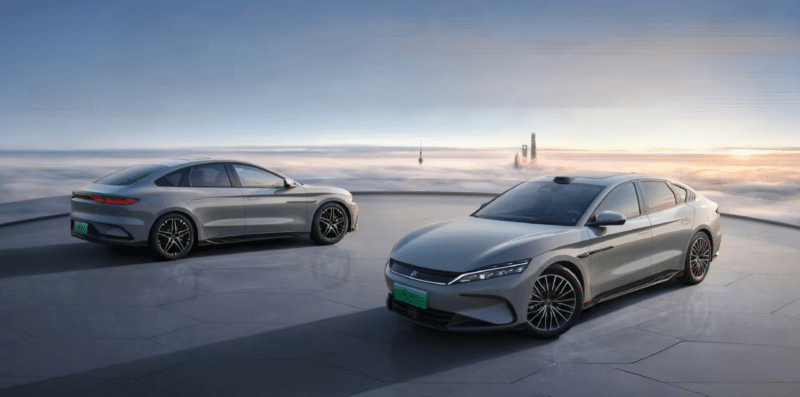BYD launches 2025 Han with significant upgrade and price reduction
BYD has officially launched the 2025 Han, offering nine versions across its DM-i and EV lineups. Prices for the new PHEV models range from 165,800 to 225,800 yuan (23,300 to 31,700 USD), while the EV version ranges from 179,800 to 235,800 yuan (25,250 to 33,100 USD). The entry PHEV variant is now cheaper by 4,000 yuan (550 USD) than the previous model, and the EV models are at the same price. Both models have significant upgrades in technology and performance, aiming to maintain Han’s position in the competitive mid-to-large sedan market.

The 2025 Han’s EV versions come with several battery options, offering driving ranges between 506 km and 701 km CLTC on a full charge, depending on the variant. These electric variants are equipped with BYD’s latest blade battery technology, known for its enhanced safety and durability. The EV models also feature fast charging, allowing drivers to recharge up to 80% in 30 minutes. Regarding performance, the EV versions can accelerate from 0 to 100 km/h in 7.9 seconds.

The PHEV version features BYD’s fifth-generation DM hybrid technology (DM-i). It combines a 1.5T turbocharged gasoline engine with an electric motor, delivering a combined output of 315 Nm of torque. The 0-100 km/h acceleration time is 6.9 seconds, while the car achieves a fuel consumption rate of 3.8L/100 km in hybrid mode. The DM-i model offers a range of up to 1,350 km CLTC on a full charge and tank.

In terms of design, the new Han models showcase subtle yet modern updates. A new color option, “fashion gray,” has been added, and both DM-i and EV variants now share a similar front-end design. The front grille has been simplified, with a sleeker, closed-off appearance for the electric models, while a black sports package accentuates the vehicle’s sporty appeal. The dimensions remain similar to previous models, with a length of 4,975 mm, width of 1,910 mm, and height of 1,495 mm, paired with a 2,920 mm wheelbase.

Interior upgrades focus on improving user comfort and technology. A 15.6-inch 2.5K touchscreen infotainment system supports multiple interactive functions, including voice commands and 3D navigation. The driver and front passenger seats are equipped with 10-point massaging systems, while ambient lighting and customizable seat settings enhance the driving experience. Additionally, the Han features a 12-speaker Dynaudio sound system designed to provide high-quality audio with adjustable sound modes and spatial focus.

The 2025 Han features BYD’s DiPilot 300 system with LiDAR and Nvidia Orin-X, offering highway and urban pilot assistance. It also includes the DiSus-C intelligent damping system, which adjusts suspension for comfort or stability. Thirty-one sensors and an updated rear suspension for improved safety are also features in the Han.

Since the BYD Han (see specs) launched four years ago, more than 800,000 units have been sold. As competition intensifies with rivals such as the Xiaomi SU7 and Geely Galaxy E8, BYD aims to sustain its lead in the domestic market with these enhancements and lowered prices.



